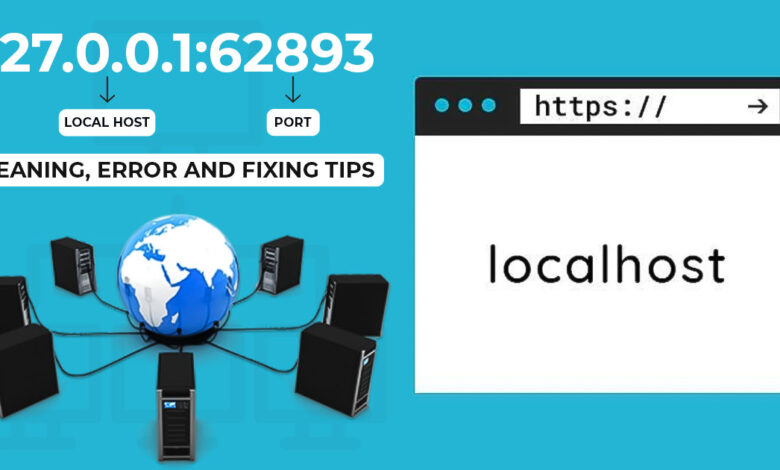127.0.0.1:62893 Explained – Boosting Cybersecurity in 2024

In the ever-evolving landscape of cybersecurity, understanding and effectively utilizing specific IP addresses and ports is crucial. One such combination, 127.0.0.1:62893, plays a significant role in maintaining and enhancing network security. In this comprehensive guide, we will delve into the intricacies of 127.0.0.1:62893, its importance, and how it can be leveraged to bolster cybersecurity in 2024.
What is 127.0.0.1:62893?
127.0.0.1, commonly known as the loopback address, is an IP address that points back to the host computer itself. This address is universally recognized and reserved for network testing and diagnostics, ensuring that the data sent to this address remains within the local system. The loopback address is essential for various network applications and troubleshooting tasks.
The port number 62893, on the other hand, is a more specific element. In networking, a port is a virtual point where network connections start and end. Each port is associated with a particular process or service. The combination of 127.0.0.1 and port 62893 signifies a specific pathway for network communication within a local machine.
Importance of 127.0.0.1:62893 in Cybersecurity
The significance of 127.0.0.1:62893 in cybersecurity cannot be overstated. It serves as a critical component in ensuring secure and efficient communication within a network. Here’s how:
- Local Testing and Development: Developers frequently use the loopback address and specific ports to test applications locally before deploying them on live servers. This local testing environment helps in identifying and fixing vulnerabilities early in the development cycle, thereby enhancing the overall security of the application.
- Network Isolation: Using 127.0.0.1:62893 ensures that the traffic remains within the local system, isolating it from external networks. This isolation is vital for testing security measures and for applications that handle sensitive data, as it reduces the risk of exposure to external threats.
- Firewall Configuration and Testing: Firewalls are essential for protecting networks from unauthorized access. Configuring and testing firewall rules using 127.0.0.1:62893 allows administrators to fine-tune security settings without risking exposure to external attacks. This process ensures that only legitimate traffic is allowed through the network’s defenses.
Leveraging 127.0.0.1:62893 for Enhanced Security in 2024
As we move into 2024, the landscape of cybersecurity continues to evolve with emerging threats and advanced technologies. Leveraging 127.0.0.1:62893 effectively can provide a robust foundation for enhancing security measures. Here are some strategies:
1. Secure Application Development
In 2024, secure application development will be more critical than ever. By utilizing 127.0.0.1:62893, developers can create a secure testing environment that mimics real-world scenarios without exposing the application to external networks. This approach allows for thorough security testing and vulnerability assessments, ensuring that applications are resilient against potential threats before they go live.
2. Advanced Network Monitoring
Network monitoring is an essential aspect of cybersecurity. Using 127.0.0.1:62893, administrators can set up advanced monitoring tools to track and analyze local traffic. This monitoring can help in detecting anomalies and potential security breaches early, allowing for swift response and mitigation. By continuously monitoring local traffic, organizations can maintain a high level of security and quickly adapt to new threats.
3. Enhanced Firewall Rules
Firewalls remain a cornerstone of network security. Configuring firewall rules to work with 127.0.0.1:62893 ensures that only authorized local traffic is permitted. This configuration can be particularly useful in environments where sensitive data is processed, as it provides an additional layer of protection against unauthorized access. Regularly testing these firewall rules using the loopback address helps in maintaining optimal security configurations.
Best Practices for Using 127.0.0.1:62893
To maximize the security benefits of 127.0.0.1:62893, it is essential to follow best practices. Here are some key recommendations:
1. Regular Security Audits
Conducting regular security audits is crucial for identifying and addressing vulnerabilities. By including 127.0.0.1:62893 in these audits, organizations can ensure that local testing environments and firewall configurations are up to date and secure. Regular audits help in maintaining a proactive approach to cybersecurity.
2. Secure Configuration Management
Ensuring that all configurations related to 127.0.0.1:62893 are secure is vital. This includes setting strong authentication mechanisms, implementing encryption for data in transit, and maintaining strict access controls. Secure configuration management minimizes the risk of configuration-based vulnerabilities and enhances overall security.
3. Continuous Learning and Adaptation
The cybersecurity landscape is dynamic, with new threats emerging regularly. Staying informed about the latest security trends and continuously adapting security practices is essential. By leveraging 127.0.0.1:62893 and staying up to date with best practices, organizations can maintain a strong security posture and effectively counter evolving threats.
Conclusion
In conclusion, 127.0.0.1:62893 plays a pivotal role in enhancing cybersecurity in 2024. By understanding its significance and leveraging it effectively, organizations can create secure testing environments, enhance network monitoring, and configure robust firewall rules. Following best practices such as regular security audits, secure configuration management, and continuous learning will further strengthen security measures.
As we navigate the complexities of the digital age, the loopback address and specific ports like 62893 will continue to be essential tools in the arsenal of cybersecurity professionals. By harnessing their potential, we can build a safer and more secure digital future.
FAQs about 127.0.0.1:62893
1. What is the purpose of 127.0.0.1:62893?
127.0.0.1:62893 is primarily used for local testing and development, ensuring traffic stays within the host machine for secure application and network configuration testing.
2. How does 127.0.0.1:62893 improve cybersecurity?
It enhances cybersecurity by isolating network traffic to the local system, reducing exposure to external threats and enabling secure, controlled testing environments.
3. Is 127.0.0.1:62893 used in live production environments?
No, it is typically used in development and testing environments to verify applications and configurations before live deployment.
4. What are the best practices for using 127.0.0.1:62893?
Best practices include regular security audits, strong authentication, encryption, strict access controls, and staying updated with cybersecurity trends.
5. Why is the port number 62893 important?
The port number 62893 specifies a unique local communication endpoint, helping organize and direct traffic for specific services during testing, ensuring isolation and security.



